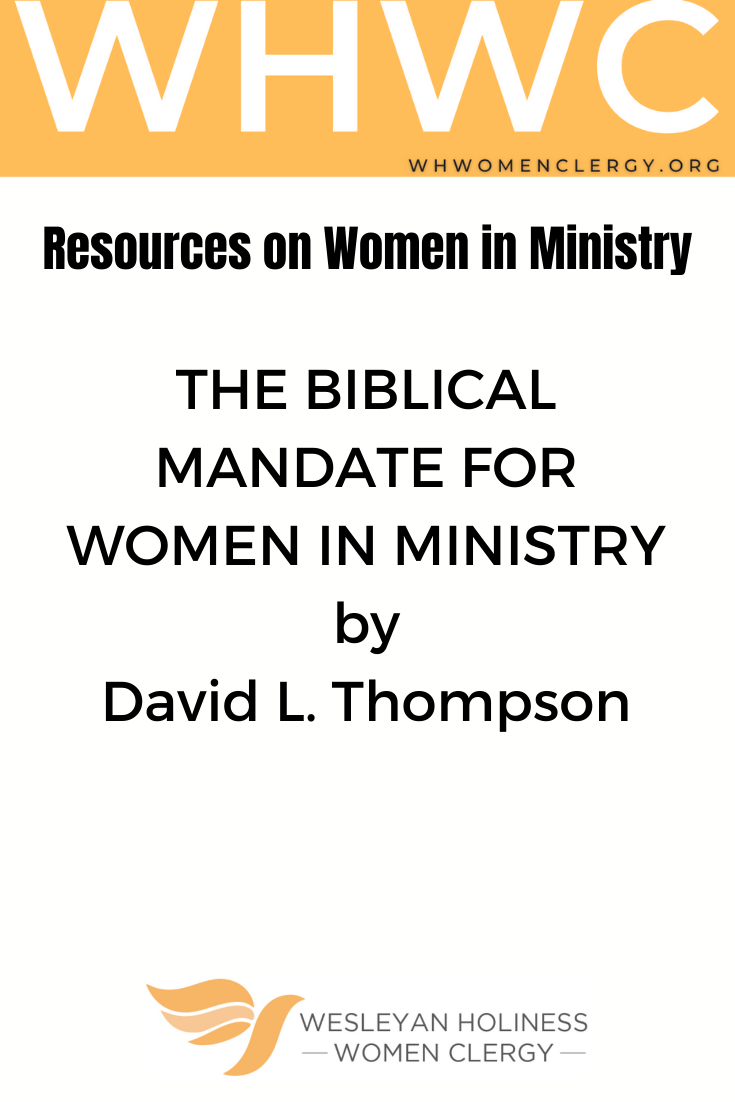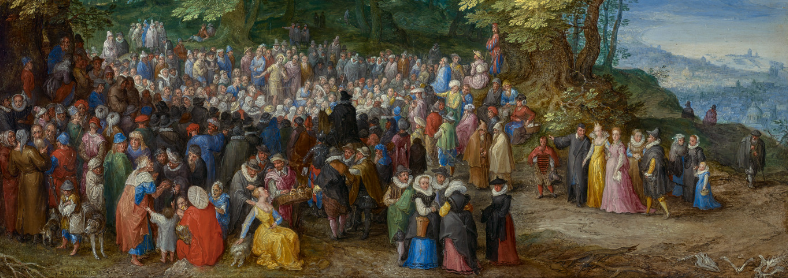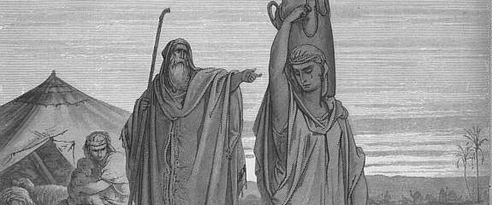The Biblical Mandate for Women in Ministry
David L. Thompson • February 2, 2022 | WHWC
Founded on Solid Biblical & Historical Foundations

Women pastors? Senior pastors? In our church? Over a hundred years ago we Wesleyans led the way in opening ordained ministry to women. So why is this an increasingly difficult topic in The Wesleyan Church?
First, some mistakenly assume that Wesleyan women who claim a call to ordained ministry and want to pastor Wesleyan churches are duped by the secular feminism, no matter how well-intentioned they may be. But this "slander by association" with secular feminism is simply wrong. Persons troubled by this sort of linkage have either forgotten the history of The Wesleyan Church and the holiness movement or have not known it. We pioneered the ordaining of women and have been doing it since before there was such a thing as "feminism." (Check out the website www.wesleyan.org and the Department of Education and the Ministry for details.)
Second, the slice of the church growth world Wesleyans have recently listened to is largely a man's world. Non-Wesleyan luminaries to which we have looked have not pointed us to the numerous women who have established and successfully led significant ministries (including churches) in North America. It's another case either of amnesia or ignorance, but the result is the same. Gifted women get the message and go elsewhere.
But the Bible itself probably presents the most difficult obstacle to ordaining and appointing women to Christian ministry. Specifically, Paul seems clearly to exclude it in 1 Tim. 2:11–15 and 1 Cor. 14:33b–36. Here, also, we must learn again how to read the Bible as a whole from our own heritage, and resist following Calvinist approaches in this matter.
Discerning the Bible's guidance on women and ministry closely parallels discerning its guidance on the issue of slavery. Our own Wesleyan-holiness forebearers helped hammer out the approach to Scripture that gave Bible authority to anti-slavery advocates of the last century. It is no accident that old-time Wesleyans, who thought the Bible supported the abolition of slavery, also led the way in biblical support of the ordination of women. Nor is it any accident that old-time Calvinists, prominent in the pro-slavery camp, also resisted in parallel arguments the "liberation" of women. The two arguments—over slavery and over women's suffrage— were similar and closely tied together biblically.
The biblical challenge is twofold: As for interpreting the Bible texts accurately in their historical contexts, both the pro-slavery and anti-slavery people tended to read their own positions into the text. On the one hand "the curse of Ham," Gen. 9:18–25, did not really support the enslavement of black Africans. On the other, Paul did not abolish slavery nor imply its abolition in Eph. 6:5–9.
The same problem of competent reading of Bible texts in their historical and literary contexts, faces persons seeking God's will from Scripture regarding the ordination of women. The most vocal present voices against the ordination of women (who happen also to be Calvinist) would have one believe these texts in 1 Tim. and 1 Cor. are straight forward, easily understood verses. The problem, they claim, is not the texts, but a compromised church, unfaithful to the truth of Scripture and afraid to confront error—the same slander thrown against our abolitionist predecessors by the pro-slavery folks.
The truth is, 1 Tim. 2:11–15 and 1 Cor. 14:33b–36 are full of difficulties. It is not easy at all to determine the Apostle's basic meaning in these texts or the actual problems he wanted to meet, let alone know how we should apply them. Recent evidence indicates that even these "plainest" of texts do not bear directly against ordination.
It was necessary to determine which texts should be read in light of which (i.e., make sense of the Bible as a whole.) Both were critical in the slavery debate, and both remain central in the "ordination of women" debate. But even if 1 Tim. 2 and 1 Cor. 14 did expressly forbid the ordination of women (which they do not), the second problem we noted earlier remains. Which texts are to be read in light of which? What sense do we make of the Bible as a whole on this question? Do we read the entire Bible in light of these two problematic texts, or do we read these two texts in light of the rest of the Bible? Here again, the way has already been forged by the anti-slavery people who founded one branch of our present denomination in 1843 (the Wesleyan Methodist Connection).
The abolitionists' most powerful anti-slavery arguments from the Bible proved not to be the Bible's statements about slavery itself, but rather other basic, irrefutable biblical claims. This larger Bible context led them to conclude that slavery was a grievous evil, an abomination to God, in spite of the fact that Moses had provided for it and Saint Paul had assumed it.
Thus, in his tract against the slave trade, John Wesley argued not from "slavery texts," but from the Bible's teaching about the mercy and justice of God. Jonathan Blanchard, Wesleyan Methodist founding president of Wheaton College, argued against slavery on the basis of "one bloodism"—God had created of "one blood" all humans (Acts 17). Charles Finney argued against slavery on the basis of common human need (all are sinful). Others relied on Gal. 3:28 (In Christ . . . no slave or free) and Lk. 4:18 (Jesus; mission of "release to the captive") and so on.
None of these persons were liberals; none of them rejected the wisdom of God nor the authority of Scripture, as their pro-slavery opponents claimed. Rather, they understood that some Bible truths, by their very nature, must logically provide the context in which other specific instructions and claims in Scripture are read.
This very same task awaits persons who want to address the "women in ministry" question adequately! We must speak not only of one or two specific texts but must make sense of biblical revelation as a whole on this question. 1 Tim. 2:11–15 and 1 Cor. 14:33b–36 stand confronted by a tidal wave of other biblical texts, Pauline and otherwise, which fly in the face of prohibiting women full entry into Christian ministry (as B. T. Roberts, the founder of the Free Methodist Church, argued persuasively a century ago.)
Our aim here is not actually to argue the point biblically, but to show what the points to argue are—and have been for over a century! Here, we underscore the fact that The Wesleyan Church's ordination of women stands not only on solid biblical grounds but on a solid, historic approach to Scripture, as well. We read Scripture on this question in ways hammered out over a century ago by the people who founded the Wesleyan Methodist Connection, the Pilgrim Holiness Church, the Salvation Army, and other similar holiness streams.
No, the problem is not lack of biblical warrant, but lack of leadership and conviction. We have to take responsibility in local churches for calling, and at district levels for appointing to leadership ministries, the women whom God is gifting and calling for those ministries in The Wesleyan Church. And we must do it.
Thompson, D. L. (1999, May). “The biblical mandate for women in ministry.”
The Wesleyan Advocate, 22–23.
Reprinted with permission of The Wesleyan Advocate, www.wesleyan.org
Dr. David L. Thompson was a teacher of biblical languages and inductive Bible study, three years at Marion College and 38 years at Asbury Theological Seminary. According to his tribute by Dr. David Durst at Wesleyan.org, "He helped The Wesleyan Church navigate scriptural controversies and come out with a high view and devotion to the Bible. His text Bible Study That Works (1982) grew out of a series of articles written for The Wesleyan Advocate and continues to be used in university courses to train emerging interpreters, teachers and preachers."

Enjoyed this article? Connect with us on one of our social media platforms. Share it and forward it to a friend:




